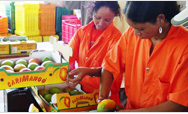You are here » Home » Telling Our Story
Success Story
Earthquake survivors head home from relief camp in time for spring
Returning Home, Renewing Lives

| |
Photo: USAID/Kaukab Jhumra Smith
|
|
A pick-up truck piled with departure kits for 10 families prepares to leave Mehra Camp. The kits will help families rebuild their lives and homes in the mountains.
“These tools and blankets will be very useful,” said Bakhmareen, a resident of Gudlai village in northeastern Pakistan’s Allai Valley. His family is one of many who received a shelter and household kit when he departed Mehra Camp.
|
The earthquake in October 2005 devastated people’s homes, livelihoods, and schools in Pakistan. Worse, it struck just before winter, when snowfall piles several feet high in mountain villages. Without adequate shelter, the families of the Allai Valley in northern Pakistan could not remain in the mountains. They sought shelter and emergency relief at Mehra tent camp near the banks of the Indus River.
As the winter passed and danger from winter snow melted away, more than 16,000 camp residents began preparing return home. To facilitate their journeys, USAID arranged programs to improve foot access back to mountainous villages; provided cash-for-work income for camp residents; set up community barns for surviving livestock of camp residents; established temporary schools in villages so returning children would be able to continue their education; and trained local teachers.
In addition, USAID provided each departing family with shelter and household kits valued at $200 to equip them for life back home. The shelter kit includes pick axes, spades, hammers, handsaws, and plastic sheets for families to build transitional shelters, while the household kit includes kitchenware, a stove, a lantern, shoes, and cloth to serve basic needs. These materials supplemented the one month’s food supply provided by the Pakistani military, including flour, oil, and rice, as well as a blanket for each family member and road transport arranged by local government.
Camp residents from the low-lying areas in Allai Valley returned first, while residents from high-altitude area waited until temperatures warm further. Nearly 600 families, or more than 4,000 people, returned home in the first weeks of March 2006. Bakhmareen, a resident of Gudlai village, said his family was happy to go back. “It was too cold to stay up in the mountains before,” he said. “Now it’s warmer, so we can put up a tent while we try to restart our lives.”
Through a host of programs to help people rebuild shelters, schools, and livelihoods, USAID is helping the families of Allai Valley return home safely and, equipped with knowledge and resources, confident in their ability to rebuild their lives.
Print-friendly version of this page (533kb - PDF)
Click here for high-res photo
Back to Top ^ | 

